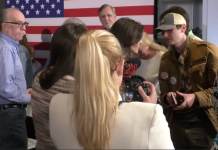This one’s gonna be a challenge to write about. Full disclosure, I am not bisexual, but I am an ally of the LGBTQ+ community and this subject fascinates me.
Bi erasure, the act of writing off bisexuality as a phase or mere confusion outside and within the community, is something that’s very real and very toxic. From an outside perspective, it is easily the most mocked, yet simultaneously exploitable, sexual orientation. The depiction of bi people in the media is hardly ever accurate or tasteful.
With the legalization of gay marriage in the United States, even if Justice Clarence Thomas’s closet wakes him up in the middle of the night as a result, one would figure the acceptance of LGBTQ+ people in society would come swiftly along with it.
Not quite.
If anything, the reaction to legalization was far more divided than it should’ve been. I guess if you don’t live a life that mirrors the nuclear family, then your life has no value outside of scorn and cheap mockery. I bring this up because people’s views on homosexuality are either accepting or hateful with almost no middle ground to be found. But people’s views on bisexuality are far more interesting… and not necessarily for the right reasons.
So, what is it that causes such a weird array of opinions and emotions?
I believe that a lot of people see the world as something very binary and the thought of someone being attracted to more than one gender doesn’t fit that viewpoint. People don’t question their opinions directly, rather we tend evolve over a period of time when provided with certain information.
Simply, it hurts to be wrong and the negative opinions toward bisexuality seem to come from a place of non-acceptance from people who don’t want to admit they might be wrong.
If it were this cut and dry, it honestly wouldn’t be worth writing an entire thinkpiece about, although gay folks and homophobes are destined to fight forever even though the latter side is losing with the kind of gloriousness usually reserved for New Orleans’ most extravagant Pride Parades. Still, the issue facing bisexual people isn’t just intolerance from outside forces, but also intolerance from within certain LGBTQ+ circles as well as the perpetual fetishism and simultaneous dismissal of those people from the entertainment industry.
Here’s a fun exercise: name off the top of your head five bisexual main/recurring characters in various TV shows over the course of history whose entire personality is not their sexual orientation . . . don’t worry, I can’t either. The problem here is that typically, like in movies such as 1974’s Butley and 2003’s Gigli or shows like The Cleveland Show and The L Word, bisexual people are depicted as confused, taboo, or horny. Any nuance tends to be stripped out and leaves bisexual people without proper representation and, by extension, completely fetishized.
I doubt I’ll shock anyone when I say that those shows and movies had straight people at the helm. The unfortunate reality is that this issue runs deeper because being ousted from a group that was never going to accept you is disheartening but understandable. Bisexual people, despite being the B in LGBT, face the same kind of ridicule from other LGBT circles.
The general feeling is that bi people are just closeted gay people or merely curious. As a result, your average bi person will refer to themselves as “gay” so they can avoid having to explain it, and this, though a small thing, greatly contributes to erasure. How bigotry exists within its own circles is another conversation for another day, but it’s important to note because it contributes to the high levels of mental health problems among bi people. How can one be happy with themselves when people that are supposed to be their allies treat them as ‘confused?’
Questions like these don’t have easy answers, nor will the problems they address go away overnight. As a non-bisexual person, I’m not sure how comfortable I feel trying to give any answers, but I can confidently say a good start would be better representation in media because public validation and support will never be a bad thing.




















